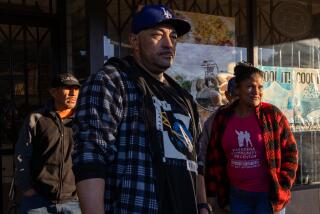Foreign Servants May Find Themselves Enslaved : Britain: Parliament is trying to remove a twist in immigration policy that permits such abuses.
- Share via
LONDON — Alice left the Philippines believing a job in civil engineering awaited her in Kuwait. When she arrived, she was offered work as a housemaid--take it or leave it.
Already in debt for her fare to Kuwait, she became a domestic slave, working night and day, sleeping on the floor and always on call by a beeper.
Alice, 29, said that continued for 2 1/2 years, in Kuwait and in London, until her employer tried to rape her.
She was locked in the house after that, but another servant helped her to escape by pushing her through a cat flap in a door.
Her face was badly scraped, Alice said, but she was thin enough from lack of food to wriggle through.
Hundreds of foreign women have lived similar nightmares behind the doors of some of London’s most exclusive addresses, says the Campaign for Justice for Overseas Domestic Workers, also known as Kalayaan.
Since 1986, the group has worked with more than 800 women servants who escaped from families that mistreated them, said Brid Brennan of Kalayaan, a Tagalog word that means “freedom.”
Another Filipina, identified only as Sandy, said she came to London with a family from the United Arab Emirates. She had to sleep in the hallway beside the toilet, and the children would slap her and pull her hair, she said.
Sandy escaped through a third-floor bathroom window one night and broke her elbow on the way down.
The women, with scarves wrapped around their heads and faces, spoke at a recent news conference called by Lord Hylton, who brought the issue to a debate in the House of Lords in November. They were identified only by first names because they now live and work in England illegally.
Anti-Slavery International, a London group formerly known as the Anti-Slavery Society, has given the United Nations a report on the problem.
Several members of Parliament are trying to remove the twist in immigration policy that allows women like Alice and Sandy to live here as slaves. Britain outlawed slavery in 1833.
Most of the women on Kalayaan’s case list are from the Philippines, but others are natives of India, Sri Lanka, Morocco, Nepal, Indonesia, Nigeria, Ethiopia or Brazil. They enter the country with foreign families coming to live in Britain or with British families returning from stays abroad.
Since 1980, the government has allowed these families to bring servants along as part of their households, without a work permit. Each is given a visitor’s visa allowing her to work for the family that brought her if she has been with the family for at least a year.
While the families are in Britain, the servants must stay with them.
“In the eyes of the British system, they have no existence,” said Dudley Fishburn, a member of Parliament from the governing Conservative Party. Fishburn is trying to get the issue debated in the House of Commons, where 104 of the 650 members have signed a petition to bring it to the floor.
“The women we are dealing with are slaves,” said Alan Whittaker, spokesman for Anti-Slavery International.
He said their passports are taken, they have no control over their lives, they cannot change jobs, and they often are harassed or beaten. Their wages are low and some don’t get paid at all, he said.
“It’s an appalling situation and it’s got to stop,” said Whittaker, who estimated that more than 3,000 such domestics are in Britain.
Many were stranded in London with no money after the Persian Gulf War broke out because the families that employed them returned home, said Sally Hautot, a lawyer for Kalayaan.
Some ran away because they feared going back to the region or because their employers stopped paying them. Hautot said more than one-fourth of the women Kalayaan has helped fled Kuwaiti employers.
When the women are on their own, they generally live underground, with no access to health care or the legal system.
Most have no difficulty finding new jobs as domestics, but they cannot leave the country until they are ready to return home for good. Most left their homes in the first place because of poverty.
The Home Office, which handles immigration matters, has agreed to issue a leaflet to incoming families bringing foreign employees.
It explains the conditions of a domestic worker’s stay, tells the employees to call police if they are assaulted or mistreated, and gives the addresses of the government immigration department and immigrant advisory service.
In a letter to Hylton in March, Home Secretary Kenneth Baker said no changes in the immigration law were planned.
“Allowing domestic workers to change jobs after arrival here would undermine the arrangement and open the U.K. labor market to an influx of overseas unskilled labor,” he said.
Leaders of the campaign want to abolish the provision on servants and make it possible for those now stranded in Britain to work legally.
More to Read
Sign up for Essential California
The most important California stories and recommendations in your inbox every morning.
You may occasionally receive promotional content from the Los Angeles Times.










